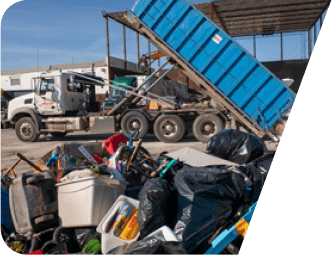
What is Considered Hazardous Waste?
The Philadelphia Area’s Top-Rated Dumpster Rental Service
When renting a dumpster from Geppert Recycling, it’s important to know what types of waste are considered hazardous and therefore cannot be placed in your rental dumpster. Whether you’re a commercial or residential customer, understanding these guidelines will help ensure that you comply with local regulations and maintain a safe environment. Here’s a comprehensive look at what constitutes hazardous waste and why these items are not accepted in dumpster rentals.
Defining Hazardous Waste
Hazardous waste includes items or materials that are dangerous or potentially harmful to human health or the environment. This waste can come from various sources, such as residential homes, construction sites, or industrial businesses, and can include a variety of materials. Typically, hazardous waste requires special disposal methods to ensure that it does not pose a risk to the environment or public health.
Common Types of Hazardous Waste
- Chemicals: Many commercial and household cleaning products contain chemicals that can be hazardous. This includes bleach, ammonia, and other chemical cleaners that can cause damage if not disposed of properly.
- Paints and Solvents: Items like oil-based paints, lacquers, stains, and paint thinners contain chemicals that are harmful to the environment. Water-based paints are generally not considered hazardous, but it’s best to check with your local waste management guidelines.
- Automotive Fluids: Used motor oil, antifreeze, and brake fluid are examples of automotive fluids that contain harmful substances. These materials can pollute waterways and should be taken to appropriate recycling locations.
- Batteries: Car batteries, lithium-ion batteries, and similar products contain heavy metals like lead and mercury that can be environmentally damaging. Such items require specific handling and disposal methods.
- Electronics: Also known as e-waste, items like computers, televisions, and smartphones contain hazardous materials, including lead and mercury. These items need to be recycled through programs designed to handle electronics.
- Pesticides and Herbicides: Many lawn and garden products contain substances that can contaminate soil and water. These chemicals must be disposed of according to specific environmental regulations.
- Aerosols: Spray cans, whether empty or full, are considered hazardous because they contain propellants and chemicals that can be explosive and toxic.
- Appliances: Refrigerators, air conditioners, and any appliances containing Freon or other refrigerants are not suitable for regular dumpster disposal due to the hazardous gases they contain.
Why Can’t Hazardous Waste Go in Dumpsters?
Hazardous waste cannot be mixed with general waste due to the potential risks it poses during the transportation and disposal process. Special methods such as incineration, chemical neutralization, or secure landfill placement are required to safely process hazardous materials. Placing these items in dumpsters can lead to environmental contamination and pose serious health risks to waste management workers and the general public.
Proper Disposal of Hazardous Waste
To dispose of hazardous waste safely, contact your local waste management authority or hazardous waste disposal facility. They can provide guidelines and resources for proper disposal and recycling options. For instance, many communities offer specific drop-off times or locations for hazardous waste.
Rent Your Dumpster in Philadelphia Today!
At Geppert Recycling, we are committed to providing safe, efficient, and environmentally friendly waste disposal services. By ensuring that hazardous materials are not placed in our dumpsters, we help protect the environment and ensure compliance with legal disposal requirements. If you have any questions about what materials can be placed in your rented dumpster, contact us today!